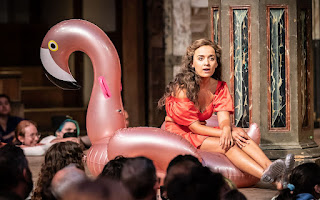He's been plotting to use this power to take revenge on those who deposed him, especially his brother Antonio (Patrick Osborne.) When Antonio, King Alonso of Naples (Katy Stephens) and other key figures sail close to the island, Prospero conjures a tempest to make them run aground.
For the most part there are two competing takes on Prospero, with one being the wise old wizard who outsmarts the people who wronged him. I lean much more towards the interpretation of him as a bitter old man who lost his Dukedom through his own folly but will manipulate anyone, including his own daughter, to get it back (just because he wants it, he has no plans that we know of to do good there.) Roberts' is a slightly less vicious version of the latter: Not a wise old man but the kind of middle-aged Brit who takes early retirement to Spain, then spends his whole time there furious if anyone doesn't speak English. He spends almost the entire play in just eye-watering yellow speedos, barking orders at the locals.
It makes him more of a ridiculous figure in a production that aims to place the play firmly in the "Comedy" category it was originally listed under in the Folios (I increasingly prefer the term "late romances" for this period of Shakespeare's work.) It takes some of the wonder out of a play whose entire plot is dependent on magic, but I think it's a fair trade to make for a more entertaining couple of hours than I can usually find in The Tempest. So Ciarán O'Brien's Caliban becomes a hassled, dishevelled cabana-boy, Lucy Phelps' Sebastian tries to flag down the helicopters flying over the Globe the rescue him, and even Olivier Huband's Ferdinand gets some laughs in his reactions to the weirdness of the island - not bad going for a character whose entire qualification as a romantic lead is "he's the first man Miranda's seen who's not related to her and hasn't tried to assault her yet."
With more of the characters getting a chance to join in the comedy, it allows for the comic subplot that's usually most keenly mined for laughs to be played a bit differently too: George Fouracres' Stefano is comparatively low-key, not so much permanently drunk as permanently hungover, the appeal of setting himself up as king of the island largely consisting of getting wheeled around everywhere in the big yellow crates that form a major element of Paul Wills' design. Meanwhile Ralph Davis' #SexyBenedick was presumably too sexy, so he's having to counteract it with a truly unflattering wig as Trinculo, who's similarly understated, and goes through with Caliban's plot mainly because he doesn't have the energy to think of something different. There's still the slapstick silliness the scenes require, but the decision to trust Fouracres, Davis and O'Brien's natural comic instincts pays dividends, without the edge of desperation in scenes that often feel they have to deliver the "comedy" promised in the billing (although we do get a singalong to "Three Lions," which I can see becoming as ubiquitous a punchline again as "Single Ladies" was for a good few years.)
For a bit more of a thoughtful side to the play we have Rachel Hannah Clarke's Ariel; where Caliban reacts to Prospero with anger, Ariel is just sad and tired from the years of serving him. Prospero spends the whole play repeatedly promising the spirit its freedom; when he finally grants it (at the last possible moment when it's no longer of any use to him,) Clarke doesn't celebrate but simply slinks away, exhausted.
I did think the amount of litter that keeps getting thrown onto the stage was going to end up being the theme for the ending, but much of it gets cleared up along the way. Instead we get an ambiguous ending where Roberts breaks off in the middle of Prospero's final speech and wanders away, leaving the rest of the characters alone and lost-looking. I'm not sure what we were meant to infer from that, unless it's that, once again, having got his Dukedom back Prospero can once again not be bothered to do anything with it. The Tempest sits somewhere in the middle of my Shakespeare ranking, there's things I have issues with (hello, Basil Exposition speech) and it's not one I necessarily get super-excited for, but nor have I seen enough painfully bad versions to make me go into the theatre pre-emptively flinching. Holmes and Page's production is one of the more original takes on the play I've seen; certainly one of the funniest.
The Tempest by William Shakespeare is booking in repertory until the 22nd of October at Shakespeare's Globe.
Running time: 2 hours 25 minutes including interval.
Photo credit: Marc Brenner.






No comments:
Post a Comment